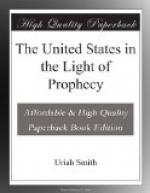It would be naturally looked for in some of the special characteristics of the papal power. Daniel, describing that power under the symbol of a little horn, speaks of it as waging a special warfare against God, wearing out the saints of the Most High, and thinking to change times and laws. The prophet expressly specifies on this point: “He shall think to change times and laws.” These laws must certainly be the laws of the Most High. To apply it to human laws, and make the prophecy read, “And he shall speak great words against the Most High, and shall wear out the saints of the Most High, and think to change human laws,” would be doing evident violence to the language of the prophet. But to apply it to the laws of God, and let it read, “And he shall speak great words against the Most High, and shall wear out the saints of the Most High, and shall think to change the times and laws of the Most High”—then all is consistent and forcible. The Septuagint reads, [Greek: nomos] (nomos), in the singular, “the law,” which more directly suggests the law of God. So far as human laws are concerned, the papacy has been able to do more than merely “think” to change them. It has been able to change them at pleasure. It has annulled the decrees of kings and emperors, and absolved subjects from allegiance to their rightful sovereigns. It has thrust its long arm into the affairs of nations, and brought rulers to its feet in the most abject humility. But the prophet beholds greater acts of presumption than these. He sees it endeavor to do, what it was not able to do, but could only think to do; he sees it attempt an act which no man, nor any combination of men, can ever accomplish; and that is, to change the laws of the Most High. Bear this in mind while we look at the testimony of another sacred writer on this very point.
Paul speaks of the same power in 2 Thess. 2; and he describes it, in the person of the pope, as the man of sin, and as sitting as God in the temple of God (that is, the church), and as exalting himself above all that is called God or that is worshiped. According to this, the pope sets himself up as the one for all the church to look to for authority, in the place of God. And now we ask the reader to ponder carefully the question how he can exalt himself above God. Search through the whole range




